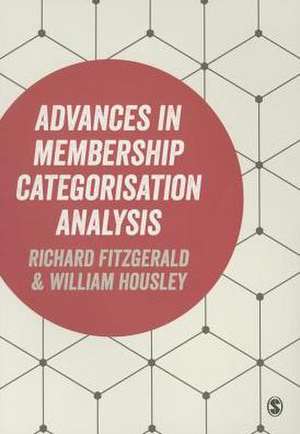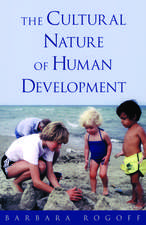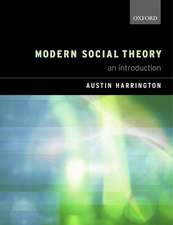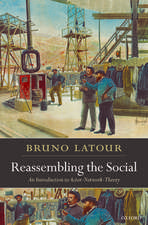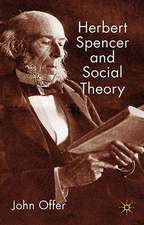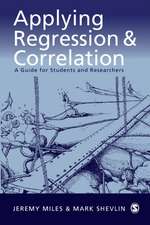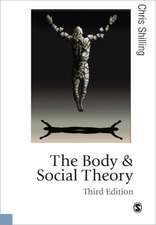Advances in Membership Categorisation Analysis
Editat de Richard Fitzgerald, William Housleyen Limba Engleză Paperback – 5 apr 2015
The book sets out the current methodological developments of MCA highlighting its analytic strength – particularly when examining social identity and social knowledge. It provides a sophisticated tool of qualitative analysis and draws from a wide range of empirical studies provided by global scholars.
The culmination of years of international research this agenda-setting text will be essential reading for academics and advanced students using membership categorization across the social sciences; particularly in media and communication studies, sociology, psychology, education, political science and linguistics.
| Toate formatele și edițiile | Preț | Express |
|---|---|---|
| Paperback (1) | 491.28 lei 6-8 săpt. | |
| SAGE Publications – 5 apr 2015 | 491.28 lei 6-8 săpt. | |
| Hardback (1) | 1084.36 lei 6-8 săpt. | |
| SAGE Publications – 5 apr 2015 | 1084.36 lei 6-8 săpt. |
Preț: 491.28 lei
Nou
Puncte Express: 737
Preț estimativ în valută:
94.02€ • 97.79$ • 77.62£
94.02€ • 97.79$ • 77.62£
Carte tipărită la comandă
Livrare economică 14-28 aprilie
Preluare comenzi: 021 569.72.76
Specificații
ISBN-13: 9781446270738
ISBN-10: 1446270734
Pagini: 208
Dimensiuni: 170 x 242 x 11 mm
Greutate: 0.5 kg
Ediția:1
Editura: SAGE Publications
Colecția Sage Publications Ltd
Locul publicării:London, United Kingdom
ISBN-10: 1446270734
Pagini: 208
Dimensiuni: 170 x 242 x 11 mm
Greutate: 0.5 kg
Ediția:1
Editura: SAGE Publications
Colecția Sage Publications Ltd
Locul publicării:London, United Kingdom
Recenzii
MCA provides an orientation, set of questions, and identification of discrete discourse devices to aid understanding of the moral work being accomplished by speakers’ and writers’ as they select category terms and tie them to descriptions. Fitzgerald and Housley’s Advances in Membership Categorization Analysis brings together cutting edge theoretical explication with fascinating examples ( YouTube posts, intimates video chatting, a review board assessing parole, a research team meeting, online breaking news updates) and is a must-read for anyone interested in identities and interaction.
A state of the art collection which is essential reading for anyone interested in social identity and social order.
Membership categories are central to the organization of culture. They set up inferential relations between classes of people, they implicate actions and thoughts, and they mark moral statuses. Membership categorization analysis develops the tradition of work started by Harvey Sacks and shows that the issues he explored are still urgent and significant. In this volume an A-list of contributors provide state of the art analyses that illustrate the ongoing vitality of membership categorization analysis. It is essential reading for anyone interested in this topic.
Richard Fitzgerald and William Housley are to be congratulated for further developing the field. In taking up such questions as the ethnomethodology of categorization (a masterful discussion by Rod Watson), the omni-relevance of categories, the precise nature of the connections between categories and predicates, the temporal reference of category usage, the relationship of categorization to “doing being ordinary” and the place of categorization in the “social life of methods,” the contributors truly bear out the promise expressed in the title of advancing membership categorization analysis.
A state of the art collection which is essential reading for anyone interested in social identity and social order.
Membership categories are central to the organization of culture. They set up inferential relations between classes of people, they implicate actions and thoughts, and they mark moral statuses. Membership categorization analysis develops the tradition of work started by Harvey Sacks and shows that the issues he explored are still urgent and significant. In this volume an A-list of contributors provide state of the art analyses that illustrate the ongoing vitality of membership categorization analysis. It is essential reading for anyone interested in this topic.
Richard Fitzgerald and William Housley are to be congratulated for further developing the field. In taking up such questions as the ethnomethodology of categorization (a masterful discussion by Rod Watson), the omni-relevance of categories, the precise nature of the connections between categories and predicates, the temporal reference of category usage, the relationship of categorization to “doing being ordinary” and the place of categorization in the “social life of methods,” the contributors truly bear out the promise expressed in the title of advancing membership categorization analysis.
Cuprins
Chapter1: Introduction to Membership Categorization Analysis - William Housley & Richard Fitzgerald
Chapter2: De-Reifiying Categories - Rod Watson
Chapter 3: Prospective and Retrospective Categorization: Category proffers and inferences in social interaction and rolling news media - Elizabeth Stokoe & Frederick Attenborough
Chapter 4: Categorization Work in the Courtroom: The ‘foundational’ character of membership categorization analysis - Christian Licoppe
Chapter 5: Challenging Normativity: re-appraising category, bound, tied and predicated features - Edward Reynolds & Richard Fitzgerald
Chapter 6: Omnirelevance in Technologized Interaction: Couples coping with video calling distortions - Sean Rintel
Chapter7: Membership Categorization and Methodological Reasoning in Research Team Interaction - William Housley & Robin James Smith
Chapter2: De-Reifiying Categories - Rod Watson
Chapter 3: Prospective and Retrospective Categorization: Category proffers and inferences in social interaction and rolling news media - Elizabeth Stokoe & Frederick Attenborough
Chapter 4: Categorization Work in the Courtroom: The ‘foundational’ character of membership categorization analysis - Christian Licoppe
Chapter 5: Challenging Normativity: re-appraising category, bound, tied and predicated features - Edward Reynolds & Richard Fitzgerald
Chapter 6: Omnirelevance in Technologized Interaction: Couples coping with video calling distortions - Sean Rintel
Chapter7: Membership Categorization and Methodological Reasoning in Research Team Interaction - William Housley & Robin James Smith
Descriere
This agenda-setting text brings together the biggest names in membership categorization analysis to provide readers with a contemporary analysis of the field and a platform to build upon when doing research.
